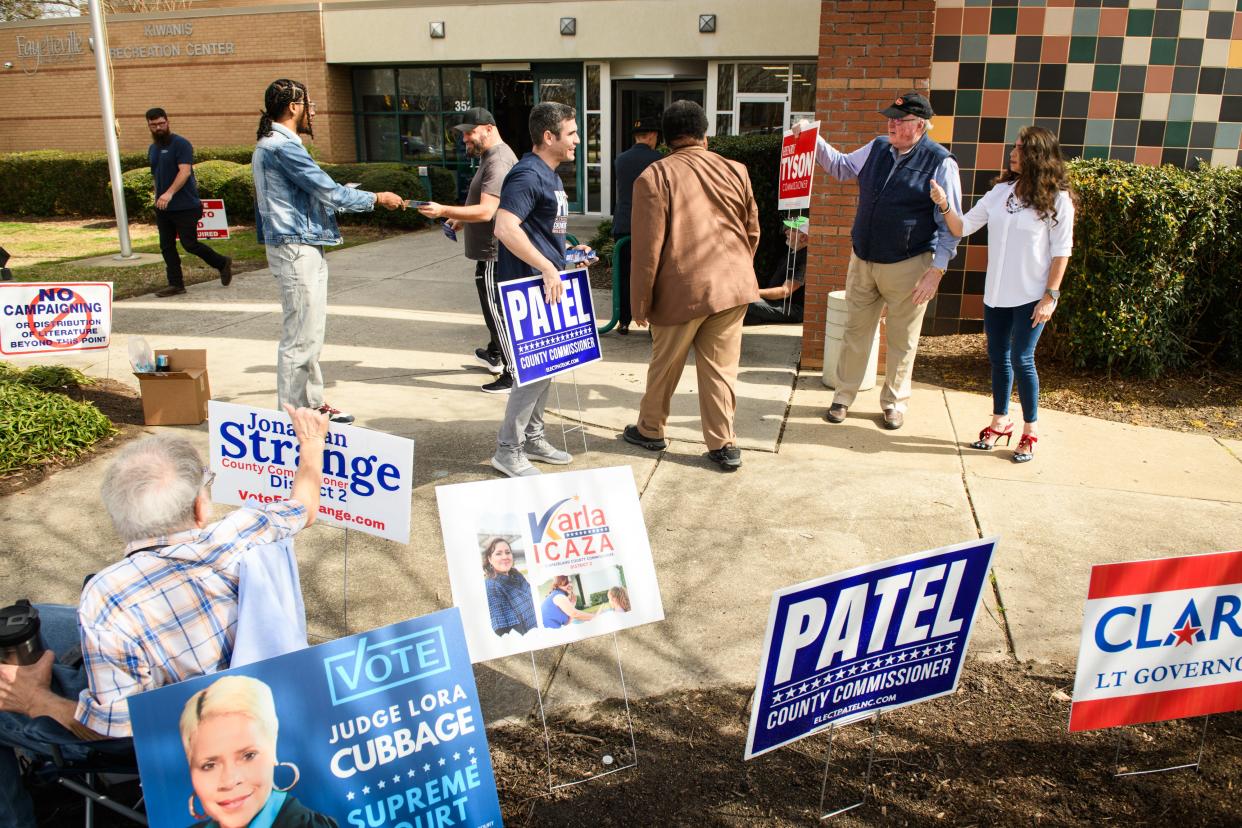A political wake-up call: More Fayetteville-area voters are abandoning political parties

You’ve heard it before: North Carolina is growing, and fast. Or maybe you’ve experienced it in your own community.
With that growth, there has been a significant increase and change in how people register to vote.
The University of North Carolina at Chapel Hill’s Carolina Population Center predicts the Tar Heel state will be the 7th most populated state by 2030.
This growth can largely be attributed to net migration — more people moving into the state than out, according to the Carolina Population Center.
Notably, the number of voters registered as unaffiliated has also been growing.
In Cumberland County, unaffiliated voters make up about 35% of registered voters this year. Twenty years ago in 2004, the same group only made up about 20.7%. This movement is seen statewide, too.
Despite the general upward trend, it’s tough to make claims about the meaning or impact of this group for several reasons. First, these voters are not a homogenous bunch. There are people in this group who vote party lines through and through and others who are truly swing voters.
One thing is clear: Unaffiliated voters do tend to be younger, according to Nathan Dollar, the director of Carolina Demography at UNC-Chapel Hill's Carolina Population Center.

For Derrick Montgomery, Cumberland County Democratic Party chair, this fact has caused concern for the party's future.
“If we don’t do something, we’re definitely going to lose our next generation of Democrats,” Montgomery said.
Data from the Carolina Population Center shows that Black voters may also be part of this party affiliation shift.
“Yet, while 84.7% of all Black voters did identify as Democrat in 2013, this figure has gradually declined to where only 75.4% of all Black voters identify as Democrat in 2023,” according to the report. “Much of this decline can be attributed to the upward trajectory of Black unaffiliated voters, moving from 12.7% in 2013 to 21.7% in 2023.”
Democrat Nigel Bristow, who is running for North Carolina’s U.S. House seat in District 9, said he thinks Black voters have felt disenfranchised and let down by the Democratic party. If they register as unaffiliated, they are, in essence, forcing candidates to work harder to win their individual vote, Bristow said. It encourages more grassroots campaigning and intentional connection with voters, he said.
More: Younger voters can influence North Carolina elections. What do they care about?
Registering unaffiliated offers a sense of freedom
Registering as unaffiliated could simply be a practical decision. In a state where primaries are semi-closed, registering unaffiliated allows voters to participate in either party’s primary, said Nadine Suzanne Gibson, assistant professor with the University of North Carolina Wilmington’s Department of Public and International Affairs.
“Registering with a party doesn't really get you anything in North Carolina,” Gibson said. “It actually gives you less freedom to vote in whatever primary you want.”
Inevitably, when these voters show up at the polls, they are presented with a political system run by two parties, leaving them to choose one or the other.
Data from the 2020 primary election showed that statewide, more unaffiliated voters voted in the Democratic primary than in the Republican primary, with 388,381 participating in the Democratic primary and 201,614 participating in the Republican primary.
Although this phenomenon might not offer much insight into a change in voter behavior at the polls, it could be a sign that feelings around politics are changing, said Jonathan Weiler, a professor at UNC-Chapel Hill and an author.
Montgomery echoed this sentiment, saying the party cannot ignore the thousands of voters registered as unaffiliated.
“Where we are now, it's a wakeup call, especially for the Democratic party,” Montgomery said.
More: By the numbers: Explore Fayetteville voter demographics
How do parties reach unaffiliated voters?
There is no one way to reach these voters because they are all over the board, Weiler said.
“It’s wrong to think of them as a monolith, and that matters because if they all thought the same way, then it would be much easier to craft a message that appealed to that group of voters,” Weiler said.
Montgomery said the Cumberland County Democratic Party is taking this shift seriously and adapting their strategy to connect with voters in response.
“We are doing more than just knocking [on] doors and making phone calls, we’re trying to create more town halls in areas where transportation is not as prevalent and bring in our candidates to those town halls,” Montgomery said. “So the community can express themselves to the candidates and hear for the candidates as well as we’re trying to hold our elected officials and candidates accountable once they’re elected and have that communication.”

Pavan Patel, a Republican running for Cumberland County Board of Commissioners in District 2, said his campaign has had to approach the campaign with an open mind since the beginning.
“If I want a Republican perspective considered, need to be willing and have to be willing to talk and work with people outside of my party,” Patel said.
Just getting an unaffiliated voter to the polls might be the biggest hurdle for parties.
In this year’s primary election, unaffiliated voters turned out at lower rates than registered Democrats and Republicans.
The key to this group voting may be less about policy and more about assuaging the general malaise around the political culture, Weiler said.
“What can you do to overcome the kind of cynicism and sense that politics is broken to get people to come out to vote,” Weiler said.
This article originally appeared on Wilmington StarNews: Are Fayetteville, NC voters abandoning political parties?
